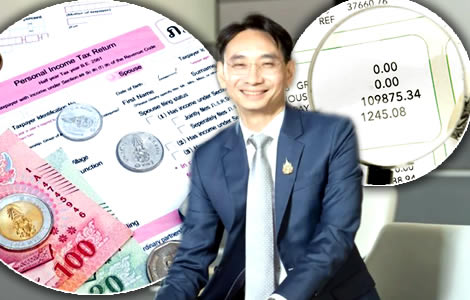Thailand’s Revenue Department plans a major tax break for expats: foreign income remitted within two years won’t be taxed. The new rule aims to boost investment, ease the tax burden, and align with OECD standards. Final approval expected by year-end.
The Revenue Department on Wednesday issued further guidance on its new tax remittance exemption for funds transferred to Thailand within two years. The exemption will apply to all tax residents in Thailand, including foreigners. However, it will not be retroactive. The government aims to enact the new rule as a royal decree before the end of the year. As a result, only foreign income remitted in 2024 will remain taxable. From this year onward, tax residents will be able to benefit from the new regime, which extends into 2026 and beyond. This reform is part of Thailand’s broader effort to align with OECD standards while keeping the country competitive for investors.

Thailand’s Revenue Department has again referred to its proposed change to taxation on foreign remittances. This was announced in May. In short, it will be a major shift in how it taxes income earned abroad. The move will affect all tax residents, especially expatriates. The new draft regulation would exempt foreign income from personal income tax if repatriated within two years.
Currently, all foreign income becomes taxable when brought into Thailand, regardless of when it was earned. This rule took effect on January 1, 2024, overturning a long-standing exemption.
Before that, only foreign income brought in the same year it was earned was taxed. Income transferred later was tax-free.
Proposed new tax regulation aims to exempt foreign income remitted within two years from income tax
But under the proposed regulation, that flexibility is coming back—with a key update. If foreign income is brought into Thailand in the year it’s earned or the next year, it won’t be taxed. However, any income brought in after two years will face full personal income tax. This applies only to people who qualify as tax residents.
That means staying in Thailand for at least 180 days in a calendar year. If someone meets that threshold, all foreign income becomes taxable—if brought into Thailand. Otherwise, that person is not accountable in Thailand for taxes.
Revenue Department Director-General Pinsai Suraswadi confirmed the details. He said the plan is designed to help the economy. “We want people to bring their money home and invest it here,” he explained.
According to Pinsai, Thais and tax residents hold over ฿2 trillion in overseas assets. These generate hundreds of billions in income each year. The government wants that money back in circulation. “More money at home means more activity in the economy,” Pinsai added.
New tax rule applies only to foreign income returns excluding capital transfers and awaits final approval
The new rule applies only to foreign income, not capital transfers. That means only interest, dividends, gains and similar returns are included.
The original amount invested abroad remains untaxed if brought into Thailand. Similarly, for capital transfers linked with expat residents. That is, of course, subject to verifying that it is not income. So far, the Revenue Department hasn’t set an exact date for the new rule to take effect.
However, the Finance Ministry is expected to finalize the regulation soon. Once active, the two-year window will begin for all new foreign income earned after that date. It’s also important to note the exemption won’t apply retroactively.
Any foreign income earned before the new rule comes into force will still be taxed under the existing law. Therefore, if the law is implemented this year, then 2024 will be the only year that foreign expats will have to account for past income. That is if remitted within two years,
The Revenue Department says this approach follows international best practices. In fact, Pinsai noted the policy is modelled on OECD standards. Thailand is seeking OECD membership and wants to align with Western tax norms.
On Wednesday, Foreign Minister Maris Sangiampongsa attended the OECD Ministerial Council Meeting in Paris. His presence signalled Thailand’s commitment to deeper engagement with global institutions. The tax reform is part of that push.
Thailand’s current tax law taxes all foreign income brought into country by residents staying over 180 days
Thailand’s existing tax rules are governed by Section 41 of the Revenue Code. This section states that all income earned by tax residents, whether domestic or foreign, is taxable once it’s brought into Thailand.
Three conditions must be met: the person must stay in Thailand for at least 180 days, the income must be earned abroad, and the income must enter Thailand. If those three are true, tax must be paid. This is, of course, only the position in the absence of the proposed new waiver. Significantly, it will do away with all tax considerations—at least on remitted income within two years.
Still, there are ways to reduce that tax bill. Double Tax Agreements (DTAs) can offer relief. Thailand has DTAs with 63 countries. These allow taxpayers to deduct foreign taxes already paid. However, the deduction comes with limits.
Thailand caps the credit at the amount owed domestically. For instance, if you pay 40% tax abroad, and Thailand taxes you at 35%, the credit is capped at 35%.
Applying double tax credits can be tricky due to treaty differences and caps on credit amounts for taxpayers
A Bangkok-based tax consultant, speaking anonymously, said applying these credits is tricky. “Each treaty is different. You have to read the fine print,” he warned.
He added that even when credits are granted, taxpayers often end up with some Thai tax liability. Thailand’s tax system uses progressive brackets. That means the more you earn, the higher your rate. The top rate is 35%.
Deductions also vary. Wage earners can deduct 50% of income, up to ฿100,000. Passive income like dividends doesn’t qualify for expense deductions. Personal deductions include ฿60,000 per person, plus another ฿60,000 for a spouse.
Life insurance payments are deductible too—if the policy runs for 10 years or more, up to ฿100,000. For expatriates, the new rule could simplify things. Many foreign residents rely on pensions, property income or offshore investments.
Until now, they faced confusion over what was taxable and when. Now, if the draft becomes law, the rules will be clearer. Income brought in within two years would be tax-free. After that, full taxes apply.
New rules aim to ease burden for most taxpayers while encouraging capital inflows and investor confidence
Still, complex cases may require help. “Some people will still need advisors,” Pinsai admitted.
But for most taxpayers, the new decree will ease the burden. “We’re not trying to punish anyone. We just want more capital here,” he said. The reform also aims to make Thailand more attractive to investors. “If more money flows into Thai bonds or stocks, our markets benefit,” Pinsai said.
He added that the government’s goal is to create incentives, not barriers. The department estimates the change could bring in significant capital. Even if only 10% of the estimated foreign-held assets return, that would inject ฿200 billion into the economy. This could help support currency stability and domestic investment.
Meanwhile, Thai officials are racing to finalize the draft before year-end. The earlier it takes effect, the sooner taxpayers can benefit. Some investors are already watching closely. Financial planners say clients are eager for certainty.
Thailand’s tax reform aims to boost competitiveness regionally and attract more foreign investment capital
This rule could also give Thailand an edge over regional competitors. Singapore and Malaysia offer tax-friendly policies to attract foreign income. Now, Thailand wants a slice of that action.
Analysts believe the reform will boost investor confidence. “People want predictability,” one financial adviser said. “This gives them a planning window. That’s valuable.”
In summary, the regulation is a two-part pitch: bring your money home, and do it fast. Within two years, no tax. Wait longer, and pay full rates.
Thai Revenue planning new decree making remitted foreign funds within one year tax-free for residents
Revenue Department preparing legislation as new Expat tax regime may link visas and tax returns
55% of Foreign Expats thought of moving out of Thailand in 2024. Majority will not file tax returns
Revenue Department boss calls on tax residents in Thailand to file 2024 returns by March 31st deadline
Though the final version is still pending, the direction is clear. Thailand wants to ease rules, attract money, and modernize its tax code. At the same time, it seeks to align with international norms while fueling its economy.
For taxpayers, the message is simple: plan now, act soon. A two-year window opens opportunity—but it won’t stay open forever.
Join the Thai News forum, follow Thai Examiner on Facebook here
Receive all our stories as they come out on Telegram here
Follow Thai Examiner here
Further reading:
With an economy in the doldrums, the Finance Ministry is still pursuing a higher tax take regime
55% of Foreign Expats thought of moving out of Thailand in 2024. Majority will not file tax returns
End of the road proposed for Thailand’s ‘Happy go-Lucky’ Economy in Paetongtarn’s Policy Statement
Revenue Department preparing legislation as new Expat tax regime may link visas and tax returns
New tax era in Thailand begins as Revenue now shares data with 138 countries within the OECD
Calls for clarification of new Tax regime which appears to target expat foreign income sources
10 year visa a magnet for global citizens setting up in Thailand with zero tax on offshore income


















